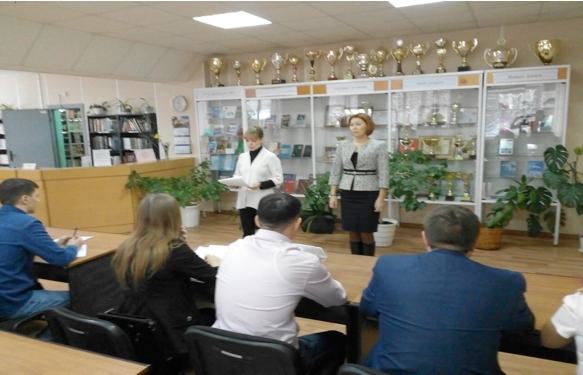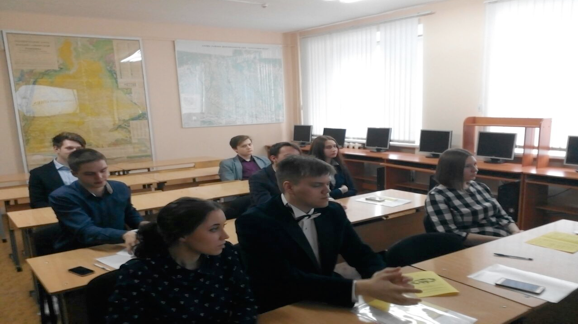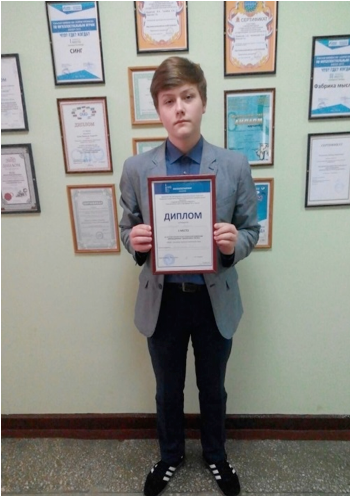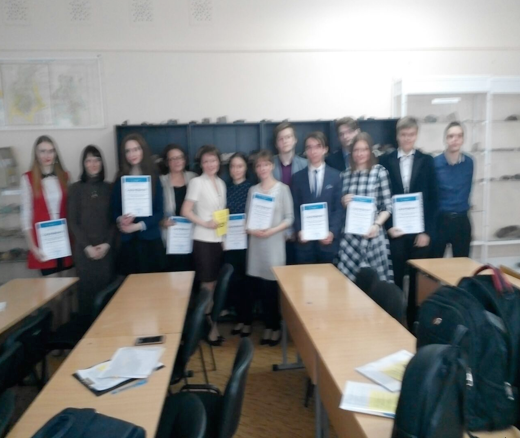

 Vol. 38 (Nº 55) Year 2017. Páge 4
Vol. 38 (Nº 55) Year 2017. Páge 4
Aygul Zufarovna IBATOVA 1
Received: 19/07/2017 • Approved: 12/08/2017
1. Theoretical aspect of the problem of students’ project and research activities
3. Organization of project and research work in educational institutions
ABSTRACT: This study addresses the issue of low students’ communication skills, basic knowledge of public; skills of processing and assimilation of information; skills in information and communication technology for selecting, processing and presenting the received information. This low level is a result of an ineffective evaluating teaching approach. Efforts have been made to overcome this problem by holding the conference as an effective form of organizing the evaluation of students’ project and research activities. This study aimed to describe theoretical and practical experience in this sphere based on pedagogical and methodological literature. The results are presented at a conference on the basis of the Branch of Industrial University of Tyumen in Surgut, the author analyzed the work of the conference and outlined prospects for working next year. |
RESUMEN: El artículo trata de una forma de diseño e investigación de trabajo con los estudiantes - conferencia. El autor cree que esta conferencia permite a los maestros para evaluar el éxito del trabajo de investigación realizado para evaluar las habilidades de comunicación, el conocimiento de los fundamentos de la opinión pública; el procesamiento de las habilidades y el aprendizaje de la información; competencias con las tecnologías de información y comunicación para la selección, procesamiento y presentación de la información recibida. Se describe la metodología de investigación de los estudiantes. Los resultados del trabajo en los proyectos de investigación presentados en la conferencia sobre la base de la rama de la Universidad Industrial de Tyumen en la ciudad de Surgut, el autor hizo un análisis de la conferencia y esbozan las perspectivas en este campo. |
The design and research activity of students occupy not the last place in the framework of modern higher and general education.
There is a contradiction between the growing complexity of the modern world and the students’ ability to orientate in it. The main task of educational institutions is preparing a graduate who can adequately respond to changes in the world, armed with practice-oriented knowledge that will enable him to realize his potential. Education should help the students in choosing one or another life and professional trajectory, the strategy of personal development. The project technology is also relevant in solving problems of individual’s self-development.
Based on higher education documents the main skills of a specialist, should be in 2025:
- communicative skills (the basis of public speech - to make reports, to have the skills of both written and oral reasoned presentation of one's own point of view;
- ability to work with large volumes of information; own personal "learning strategies" aimed at processing and assimilating information; information and communication technologies for the selection of the optimal regime for obtaining foreign information, its subsequent processing and presentation;
- the skills of lifelong learning during life and flexible adaptation in changing life situations (Gritskevich, 2008)
Therefore, the problem of organizing the students’ project and research activities is an actual problem today.
Project-research work occupies a special place in the student's educational activity.
The concept of "project-research work of students" is connected with such concepts as "project", "research", "scientific research", "research activity".
The term "research" is "the process of developing new scientific knowledge, one of the types of cognitive activity" (Gubsky, 2011).
Scientific research is characterized as "purposeful cognition, the results of which are in the form of a system of concepts, laws and theories, it is aimed at obtaining fundamentally new knowledge that other researchers have not paid attention to and should be correlated with norms and traditions worked out in the relevant scientific community" (Bim-Bud, 2003).
Research activity also involves analysis of the obtained results, evaluation of the development of the situation on their basis, forecasting (construction of hypotheses) in accordance with this further development of the situation. (Spirin, 1981)
The students’ project activity is a joint educational, cognitive, creative activity of students, which has a common goal, methods of activity. An indispensable condition for the project activity is the availability of preconceived notions about the final product of the activity, the stages of project and implementation of it, including its comprehension and reflection of the results of activities (Ibatova et al, 2017).
Ippolitova N.V. notes the interconnection of the concepts "research activity" and "educational and research", shows their interrelation, but ambiguity. «Research activities of students, as a special kind of cognitive activity, are aimed at obtaining new objective scientific knowledge. This type of activity may be available to individual students of the university, since the acquisition of a really new knowledge for science during university education is unlikely "(Ippolitova et al, 2017).
"Educational and research activities are activities where main goal is the educational result, it is aimed at teaching students, developing their research competences. The main function of educational and research activities is to activate cognitive students’ activity, develop the desire to cognize and transform themselves and the surrounding reality according to the laws of scientific research" (Ippolitova et al, 2017).
So, the concepts of "research" and "educational and research" activities of students are interrelated, but not identical.
The interconnection of these concepts is due to the fact that they represent different types of research activities and they are aimed primarily at developing the research culture of students. The difference between these concepts is the character of the result (Sterchova et al, 2017): the research activities of students involve the acquisition of new scientific knowledge of general cultural significance. In teaching and research activities, students acquire subjectively new knowledge that is new and personally significant to them.
The project and research activity should be included in the education in the general educational institution within the framework of the integrated general and supplementary education program. At the same time, research activity can be included in the courses included in the basic curriculum or in the block of additional education (group theoretical and practical classes in separate thematic areas, individual classes and consultations on the topics of research being carried out).
Project and research activities of university students can be considered as a form of organization of teaching and educational work and implements several interrelated functions:
1) educational (expansion of knowledge on various educational disciplines, fixation of general and special scientific concepts of studied disciplines, etc.);
2) developing (development of creative, research abilities, etc.);
3) activity-based (involving students in independent research activities, mastering information and communication technologies to select the optimal mode for obtaining information, its subsequent processing and presentation;
4) stimulating (the formation of an installation for the immanence of the availability of research competencies for a future specialist in any field of activity), etc. (Sterchova et al, 2017).
The data was collected with the following research methods: analysis, synthesis, generalization, classification, descriptive method, study of pedagogical and methodological literature.
Before the start of project and research work, it is necessary to carry out preparatory work. The teacher must find time resources to avoid overloading the students. In addition, the teacher must provide students with the necessary equipment: material, educational, methodical, information, information technology resources, organizational support.
From the experience of work in higher education and we have identified several stages of work on this activity:
I. Selection of the direction of future research activities. The teacher and the students, identify the area of students’ interests, they determine the actual problem.
II. Development of a research program (the researchers describe the plan of the proposed study).
III. Choice of the topic, statement of goals and objectives of the research, promotion of the hypothesis (setting goals, tasks, hypotheses).
IV. Selection and mastering of research methods (main literary sources).
V. Collection and initial processing of material (analysis of data collection methods)
VI. Analysis, conclusions.
VII. Presentation.
There are the following forms of project and research activities of students.
Individual forms: reports, abstracts, articles, reports, research, course, diploma projects and final qualification works.
Mass forms of research: assemblies, congresses, conferences, symposia, forums, etc.
We believe that the most effective form of work and reporting, presentation of your research is the conference.
The conference is a meeting of any organizations, groups, states, as well as individuals, scientists to discuss certain, often theoretical, issues (Belkin, 2005).
Conferences are organized to provide problematic and commentary information and are characterized by the ability to obtain first-hand information, verify information and update versions with questions. With reference to the research activity of students, the following types of conferences are distinguished:
- faculty, inter-faculty, university, inter-university, regional, regional, federal, international, etc .;
- scientific, scientific-practical, scientific-methodical, etc .;
- full-time, part-time; part-time; on-line conference, Internet conferences, videoconferences, press conferences, exit conferences, etc.
So, in 2016-2017 teachers of the Tyumen Industrial University conducted and organized research activities of students in the Branch of Industrial University of Tyumen in Surgut in 2016-2017. More than 50 students took part in project and research activities. During the year, students conducted their research and presented their results in the form of a project at the internally-extramural international conference "ACTUAL PROBLEMS OF SCIENTIFIC KNOWLEDGE. NEW TECHNOLOGIES OF TEC-2017 ", in April 2017 on the basis of the Branch of IUT in Surgut.
The conference was attended and attended by secondary school students, university students, teachers from different universities, numerous invited, etc. All the speakers were awarded diplomas. All research papers will be published in the collection of the international conference "Actual Problems of Scientific Knowledge. New Technologies TEC-2017 "on the basis of Industrial University of Tyumen in Surgut.
Four sections headed by the chairmen worked at the conference:
I. New technologies - for the oil and gas region: Geology, drilling and development of oil and gas deposits;
II. New technologies for the oil and gas region: transport of hydrocarbons and oil and gas field equipment;
III. Operation of transport-technological machines;
IV. Science and the Humanities.
Figure 1.
The conference is opened by the director of the Branch of
Industrial University of Tyumen in Surgut, Tyukavkina O.V.

-----
Figure 2
Section “Sciences and Humanities” The students
are listening and answering questions.

In the section of Science and Humanities, first-year students took part in projects: “The Importance of the English Language in Today's World”; “Anglicisms in modern Russian”. A pupil of school №30 Vadim Merkulov in Surgut presented the project "My University: Reality or Dream".
Figure 3
A pupil Vadim Merkulov presented the project "My university: reality
or dream" and received a diploma of the conferenceparticipant

-----
Figure 4
All the students got diplomas and certificates as the conference participants

The organization of the project research work in the school is a relatively new direction of activity, therefore, as a result of the work during the year and after the conference as a form of evaluating students' research projects, we identified the problems and work prospects for the following year:
I. Many students present the same project at several competitions or conferences.
II. Lack of interaction between school teachers, university professors, business leaders, research staff in the preparation of research projects for students.
III. The lack of uniform requirements of different levels of educational institutions for the evaluation and preparation of project and research work for students at different levels of education are not spelled out in the documents.
IV. Lack of methodological support for teachers of the school by higher education (seminars, consultations, refresher courses in this field).
V. lack of a system of mutual cooperation in the organization of research work between various educational institutions, departments, innovation laboratories, enterprises, etc.).
VI. Copied from educational sites material, or presentation of the project, downloaded from the network of learning resources as innovative.
Based on the highlighted problems, we offer the following solutions to these problems.
1. Developing documents regulating the interaction of the school-university-enterprise in the field of research activities. In these documents, there should be a justification for the formation of a certain site on the basis of a university or an anonymous organization for the organization of research work of students, with the possibility of using their laboratories; regulations, work plans, responsible persons (scientific supervisors) were appointed to carry out this work.
2. Organize methodological seminars, master classes for teachers of schools for research activities.
3. Introduction of automatic text verification system for the availability of borrowings from publicly available network sources.
Almaz R. Gapsalamov, Zemfira V. Gallyamova, Oksana V. Zakirova, Elmira R. Ibragimova, Ayziryak N. Tarasova, Rashida Kh. Tirigulova (2016) Foreign Students' Adaptation to the Social and Educational Environment Teachers'Cultural and Professional Competency Formation. The European Proceedings of Social & Behavioral Sciences EpSBS. Volume XII, Pages 404-410 / http://dx.doi.org/10.15405/epsbs.2016.07.64
Belkin, AS Dissertational Council on Pedagogy, 2005. - 208 p.
Gritskevich, T.I. Tendencies of reforming the national education: conceivable and real in the implementation of the national project, 2008. № 3 (24). - P. 189-196.
Ibatova, A.Z., Mukhametgaliyeva, S.Kh., Mukhametgaliyev, I.G., Kuzmenko, V. I., Sterhova, M. I., Musabirova, D.A. (2017) Foreign language as an effective means of education. Man in India, Volume 97, Issue 2, Pages 11-17.
Ippolitova, N, V., Sterkhova NS Problems of continuing professional education in the 21st century: materials of the international. Sci. Symposium / Intern. Acad. Sciences ped. Education, Shadr. State. Ped. In-t. - Shadrinsk: ShGPI, 2009. - 391 p. - p.155-160
Pedagogical encyclopedic dictionary, 2003. – 528 p.
Philosophical Encyclopaedic Dictionary / et al; Comp. E. F. Gubsky, 2011. - 570 p.
Spirin, L.F. Formation general pedagogical skills of the teacher, 1981. – 435p.
1. Industrial University of Tyumen, 625000, Ural Federal District, Tyumen Region, Tyumen, Volodarsky Str. 38.Russia, E-mail: aigoul@rambler.ru